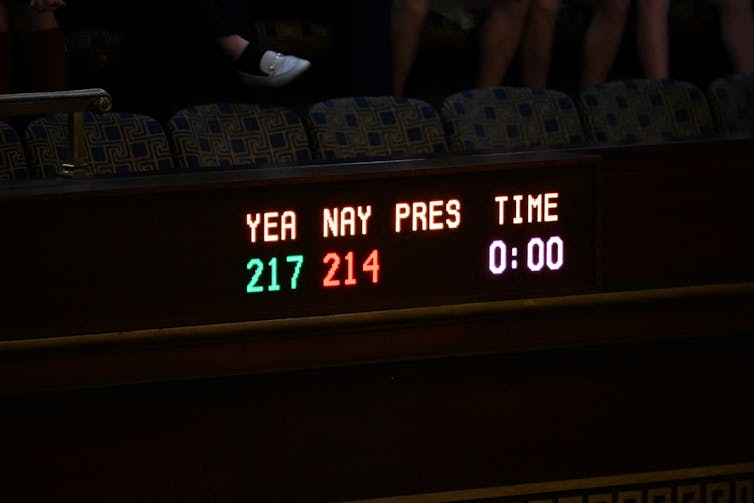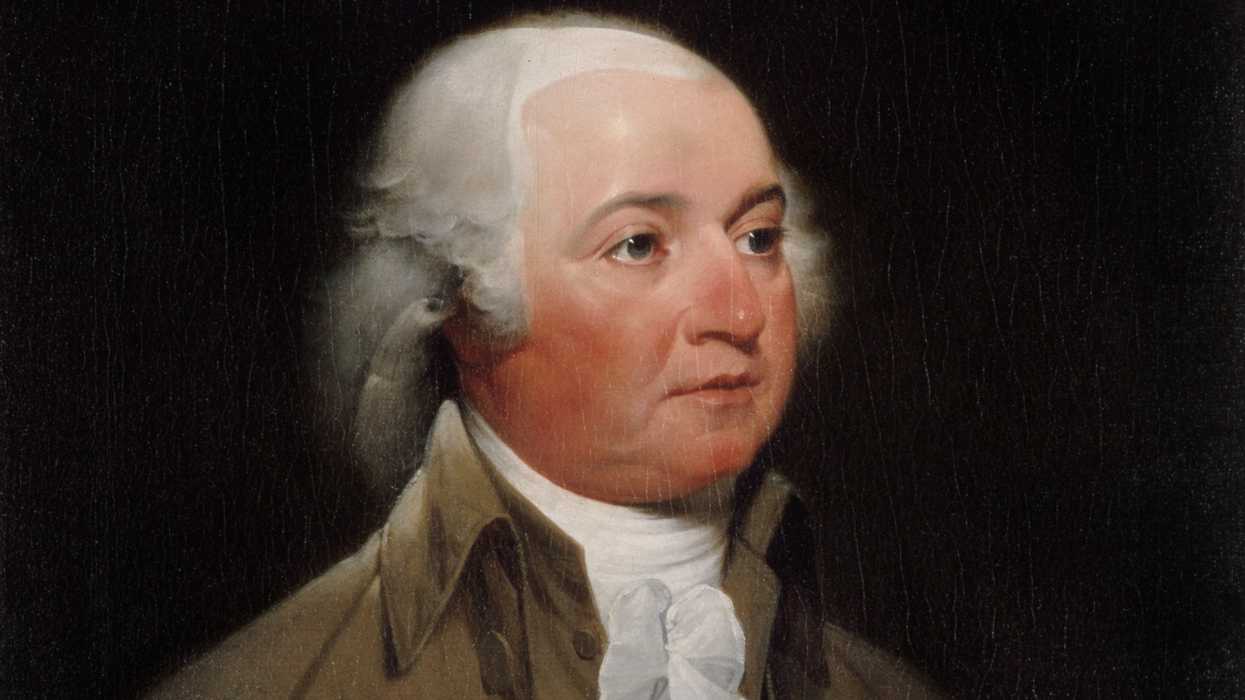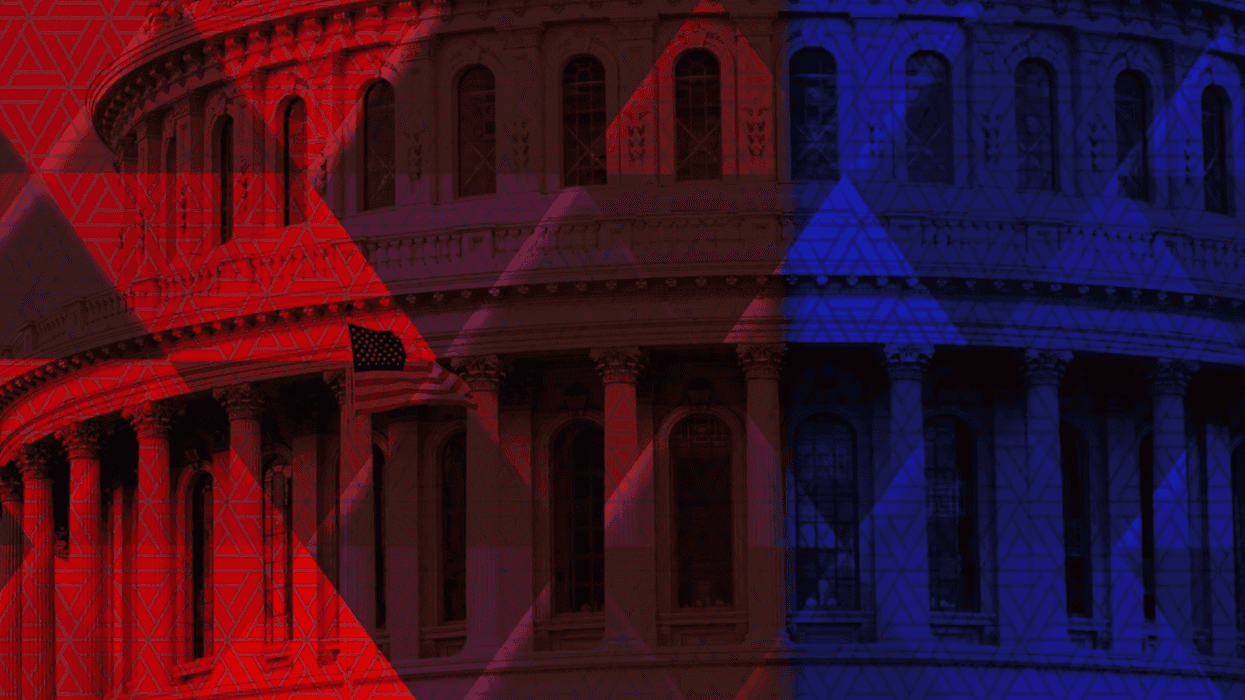Site Navigation
Search
Latest Stories
Join a growing community committed to civic renewal.
Subscribe to The Fulcrum and be part of the conversation.
Top Stories
Latest news
Read More
For 80 Years, the President’s Party Has Almost Always Lost House Seats in Midterm Elections, a Pattern That Makes the 2026 Congressional Outlook Clear
Feb 05, 2026
Now that the 2026 midterm elections are less than a year away, public interest in where things stand is on the rise. Of course, in a democracy no one knows the outcome of an election before it takes place, despite what the pollsters may predict.
Nevertheless, it is common for commentators and citizens to revisit old elections to learn what might be coming in the ones that lie ahead.
The historical lessons from modern midterm congressional elections are not favorable for Republicans today.
Most of the students I taught in American government classes for over 40 years knew that the party in control of the White House was likely to encounter setbacks in midterms. They usually did not know just how settled and solid that pattern was.
Since 1946, there have been 20 midterm elections. In 18 of them, the president’s party lost seats in the House of Representatives. That’s 90% of the midterm elections in the past 80 years.
Measured against that pattern, the odds that the Republicans will hold their slim House majority in 2026 are small. Another factor makes them smaller. When the sitting president is “underwater” – below 50% – in job approval polls, the likelihood of a bad midterm election result becomes a certainty. All the presidents since Harry S. Truman whose job approval was below 50% in the month before a midterm election lost seats in the House. All of them.
Even popular presidents – Dwight D. Eisenhower, in both of his terms; John F. Kennedy; Richard Nixon; Gerald Ford; Ronald Reagan in 1986; and George H. W. Bush – lost seats in midterm elections.
The list of unpopular presidents who lost House seats is even longer – Truman in 1946 and 1950, Lyndon B. Johnson in 1966, Jimmy Carter in 1978, Reagan in 1982, Bill Clinton in 1994, George W. Bush in 2006, Barack Obama in both 2010 and 2014, Donald Trump in 2018 and Joe Biden in 2022.
Exceptions are rare
There are only two cases in the past 80 years where the party of a sitting president won midterm seats in the House. Both involved special circumstances.
In 1998, Clinton was in the sixth year of his presidency and had good numbers for economic growth, declining interest rates and low unemployment. His average approval rating, according to Gallup, in his second term was 60.6%, the highest average achieved by any second-term president from Truman to Biden.
Moreover, the 1998 midterm elections took place in the midst of Clinton’s impeachment, when most Americans were simultaneously critical of the president’s personal behavior and convinced that that behavior did not merit removal from office. Good economic metrics and widespread concern that Republican impeachers were going too far led to modest gains for the Democrats in the 1998 midterm elections. The Democrats picked up five House seats.
The other exception to the rule of thumb that presidents suffer midterm losses was George W. Bush in 2002. Bush, narrowly elected in 2000, had a dramatic rise in popularity after the Sept. 11 attacks on the World Trade Center and the Pentagon. The nation rallied around the flag and the president, and Republicans won eight House seats in the 2002 midterm elections.
Those were the rare cases when a popular sitting president got positive House results in a midterm election. And the positive results were small.
 The final – and close – tally of the House of Representatives’ vote on President Donald Trump’s tax bill on July 3, 2025. Alex Wroblewski / AFP via Getty Images
The final – and close – tally of the House of Representatives’ vote on President Donald Trump’s tax bill on July 3, 2025. Alex Wroblewski / AFP via Getty Images
Midterms matter
In the 20 midterm elections between 1946 and 2022, small changes in the House – a shift of less than 10 seats – occurred six times. Modest changes – between 11 and 39 seats – took place seven times. Big changes, so-called “wave elections” involving more than 40 seats, have happened seven times.
In every midterm election since 1946, at least five seats flipped from one party to the other. If the net result of the midterm elections in 2026 moved five seats from Republicans to Democrats, that would be enough to make Democrats the majority in the House.
In an era of close elections and narrow margins on Capitol Hill, midterms make a difference. The past five presidents – Clinton, Bush, Obama, Trump and Biden – entered office with their party in control of both houses of Congress. All five lost their party majority in the House or the Senate in their first two years in office.
Will that happen again in 2026?
The obvious prediction would be yes. But nothing in politics is set in stone. Between now and November 2026, redistricting will move the boundaries of a yet-to-be-determined number of congressional districts. That could make it harder to predict the likely results in 2026.
Unexpected events, or good performance in office, could move Trump’s job approval numbers above 50%. Republicans would still be likely to lose House seats in the 2026 midterms, but a popular president would raise the chances that they could hold their narrow majority.
And there are other possibilities. Perhaps 2026 will involve issues like those in recent presidential elections.
Close results could be followed by raucous recounts and court controversies of the kind that made Florida the focal point in the 2000 presidential election. Prominent public challenges to voting tallies and procedures, like those that followed Trump’s unsubstantiated claims of victory in 2020, would make matters worse.
The forthcoming midterms may not be like anything seen in recent congressional election cycles.
Democracy is never easy, and elections matter more than ever. Examining long-established patterns in midterm party performance makes citizens clear-eyed about what is likely to happen in the 2026 congressional elections. Thinking ahead about unusual challenges that might arise in close and consequential contests makes everyone better prepared for the hard work of maintaining a healthy democratic republic.
For 80 years, the president’s party has almost always lost House seats in midterm elections, a pattern that makes the 2026 congressional outlook clear was first published on The Conversation and was republished with permission.
Robert A. Strong is a Senior Fellow with the Miller Center at the University of Virginia.
Keep ReadingShow less
Recommended
Barbershops Are Helping Black Boys See Themselves as Readers
Feb 04, 2026
Barbershop Books, an organization whose award‑winning literacy programs celebrate, amplify, and affirm the interests of Black boys while inspiring kids to read for fun, has spent more than a decade transforming everyday community spaces into joyful reading hubs. That mission was on full display this Martin Luther King Jr. Day, when the organization partnered with a neighborhood barbershop in the Bronx—Flava In Ya Hair—to offer free haircuts and free children’s books to local families.
As families examined stacks of Dog Man, Fly Guy, Captain Underpants, and Diary of a Wimpy Kid, barbershop owner Patrick shared that growing up, reading was associated with negative school experiences and used as a punishment at home. “Go in your room and read!” he said.
As a father of young children, Patrick now sees reading differently. He pointed out how beat up Pete the Cat looked. “I had never heard of the book,” he said, “but all the kids love it. You can tell because it’s all torn up.”
This barbershop owner tells a very different story about Black boys and reading than the narrative communicated by national test scores. His experience also highlights what America gets wrong in supporting Black boys on their reading journeys.
When people learn about Barbershop Books’ work creating child-friendly reading spaces in barbershops in New York City, Philadelphia, and other cities, they inevitably ask the same question: How do you choose your books? They often lean in, as if waiting for top-secret information, but my answer is always the same simple response. We ask Black boys what they like to read. We buy the books they recommend. And then we distribute those books to our national network of barbershops.
For many adults, this sounds obvious. But in practice, it’s rare. At a time when schools and families have more data about children than ever before, one thing is often missing from book lists curated for Black boys: direct input from the boys themselves. When you search “book lists for Black boys” online, you’ll rarely see titles like Pete the Cat, Dog Man, or Captain Underpants.
When curation starts and stops with parts of Black boys that adults can see, such as their skin color, books can become small windows and circus mirrors that distort how boys see themselves and understand the world around them. Barbershop Books serves many boys who enjoy reading but who don’t consider themselves readers because the content that most interests them isn’t affirmed by the adults in their lives. My only ask is that if a Black boy asks for a specific book, give him that specific book. If he can’t read it yet, read it to him. And if there’s another book you think he might like, read him that book too.
Carefully curated titles that center and celebrate Black boys and Black history are essential. At a time when children’s access to books is increasingly shaped by adult fear and politics, we must continue to lift up Black authors and illustrators who tell stories that recognize the full humanity of Black boys, their diverse lived experiences, and the history that shapes their present realities. There is space in Black boys’ relationships with stories for joy and silliness, imagination, and curiosity. There’s also room for conversations about history and the many times when humanity has failed to exercise humility, empathy, and compassion. There’s room on Black boys’ bookshelves for Pete the Cat, Crown: An Ode to the Fresh Cut, Bud, Not Buddy, and One Piece.
Black boys are navigating literacy challenges that are too often framed narrowly as skills deficits with little consideration for the conditions that fuel America’s worsening reading motivation crisis. What child or adult wants to be tortured with wack stories or stories read wackily? As a former kindergarten and first-grade teacher, I can confidently say that teaching reading isn’t easy. However, children can’t read more and get worse at reading. So, the question we should all be asking ourselves is what inspires kids to read for fun?
For more than a decade, Barbershop Books has focused on cultivating Black boys' reading identities by partnering with barbershops to make reading feel possible, enjoyable, and worth choosing. In these male-centered cultural hubs, Black boys feel welcomed, affirmed, and supported. Beyond their entrepreneurship and artistry, many barbers serve as mentors and role models who make reading visible and normalized rather than forced.
The Barbershop Books program isn’t just a good idea or a feel-good story. It works. A two-year evaluation led by NYU education professor Dr. Susan Neuman, funded by the William Penn Foundation, found that Black boys in barbershops with the Barbershop Books program are significantly more likely to be observed reading than boys in shops without it. When asked how they saw themselves, boys most often identified as gamers, followed by basketball players. But in participating barbershops, Black boys were just as likely to identify as readers as they were as basketball players. This matters because when boys identify as readers, they read more for fun and perform better in school.
Black History Month invites us to reflect on legacy, resistance, and possibility. One way to honor America's many freedom fighters is by protecting Black boys’ right to joy, curiosity, and agency. And sometimes it takes the form of a book about a blue cat and his four groovy buttons.
Alvin Irby is the founder and executive director of Barbershop Books, the 2025 Grand Prize winner of the Wharton School’s Lipman Family Prize at the University of Pennsylvania. His writing on literacy and education has been widely syndicated, reaching millions of readers.
Keep ReadingShow less

Indoor air can be 10x more polluted than outside. Learn how to reduce toxins in your home with non-toxic carpets, natural materials, and air-purifying plants.
Getty Images, DuKai photographer
Engaging With Nature Can Inspire Individuals To Ease Climate Change
Feb 04, 2026
Climate change-driven global warming threatens the Winter Olympics, creating treacherous conditions for athletes. Warmer winters result in heavier, more dangerous snow. This warming can cause athletes to overheat and lead to equipment failures.
In a survey by Scott et al. in Current Issues in Tourism, 339 athletes and coaches from 20 countries detail many of these dangerous conditions. Competing in warm weather can cause overheating. High temperatures raise heart rates and body temperatures and cause fatigue. Boots can soften in warm conditions, making skis harder to control. Rising temperatures cause snow to turn to slush, decrease speeds, and create holes in landing areas. These conditions are unsafe and increase athletes' risk of injury.
By 2050, only 52 of the current 93 Winter Olympic hosting sites will have the snow depth and cold enough temperatures to remain hosts. There may be only one site left by the end of the century if global warming continues. The future of the Winter Olympics depends on fighting climate change.
As the 2026 Winter Olympics open this week in Italy, this is an ideal moment to raise awareness of global warming. While the challenges faced by athletes are daunting, they also present an opportunity to inspire personal action against climate change.
As an environmental educator for 35 years, I’ve seen how nature inspires people to act on climate change. Building a personal connection with nature is crucial for promoting environmental care.
A recent 2025 study by Kenyon et al., titled Connection to Nature, highlights that engaging with nature boosts human well-being. This connection motivates people to take pro-environmental actions.
The natural world is awe-inspiring. Gazing at a starry sky or a grand forest sparks wonder. Snow-capped mountains and stunning waterfalls stir deep emotions. Experiencing nature rekindles people's bond with the environment. Remembering why people love the environment motivates them to protect it.
However, more than 4 billion people live in cities with limited opportunities to connect with nature. In the United States, over 280 million people live in urban areas and spend 85% of their time indoors.
A 2025 article published in Frontiers in Virtual Reality states that modern lifestyles disconnect people from nature. This gap shows the need for new ways to bring nature into daily life.
Many people live in urban areas with limited access to nature. Incorporating indoor plants is a practical solution. Indoor plants can help people reconnect with nature, just like being outside does.
I inherited a spider plant from my mother. It reminded me of her love and brought me comfort. I took good care of it, and it thrived. The plant also cleaned the air, making me realize it could comfort others, too.
According to a 2025 article in People and Nature by Grénman et al., connecting with nature enhances overall well-being. Imagine the joy of seeing vibrant green plants, trees, and flowers indoors or listening to a small waterfall at home or at work. Engaging with nature indoors can be a daily reminder of people's love for it and why they want to take care of the planet.
The Cala Saona House in Bali is a perfect example of a nature-filled space that evokes serenity. This house uses teak, local stone, and tropical plants to create a peaceful atmosphere. Tall palms and ferns fill the 30-foot-high ceiling, creating a tranquil atmosphere. Such spaces can inspire individuals to develop their own nature-infused environments.
In a 2025 Natural England publication, Kenyon et al. reported that immersing oneself in nature indoors improves both physical and mental health. Consider starting with a single indoor plant in your workspace or home. Even a single plant can improve air quality and enhance well-being.
Plants have the remarkable ability to absorb toxins from home furnishings. Spider plants and pothos absorb toxins through their leaves, reducing indoor air pollution. Spider plants can lower pollution by 60% in 80 minutes. One pothos plant lowers contaminants by 33% in 50 minutes. These plants are easy to grow indoors, improve air quality, and help reduce stress and anxiety.
Unfortunately, engineers need to conduct further studies to determine the types and numbers of plants needed to create optimal health-promoting environments. Solving these issues is key to improving personal health and motivating climate action.
Transform your living and working space by incorporating natural elements. Start with one easy-to-care-for plant like a pothos and notice the difference it makes in your life.
The sustainability of the Winter Olympics—and our planet—depends on our individual and collective action against climate change.
Carole Rollins has been an environmental educator for 35 years, holds a Ph.D. in environmental science, and has taught environmental education at the University of California, Berkeley. Carole has received the White House Millennium Green Award and the National Endowment for the Arts Public Education and Awareness Award.
Keep ReadingShow less

When institutions fail, what must citizens do to preserve a republic? Drawing on John Adams, this essay examines disciplined refusal and civic responsibility.
en.m.wikipedia.org
John Adams on Virtue: After the Line Is Crossed
Feb 04, 2026
This is the third Fulcrum essay in my three-part series, John Adams on Virtue, examining what sustains a republic when leaders abandon restraint, and citizens must decide what can still be preserved.
Part I, John Adams Warned Us: A Republic Without Virtue Can Not Survive, explored what citizens owe a republic beyond loyalty or partisanship. Part II, John Adams and the Line a Republic Should Not Cross, examined the lines a republic must never cross in its treatment of its own people. Part III turns to the hardest question: what citizens must do when those lines are crossed, and formal safeguards begin to fail. Their goal cannot be the restoration of a past normal, but the preservation of the capacity to rebuild a political order after sustained institutional damage.
When the Republic Fails Its Own Test
A government that mistreats its own people does not stop because citizens are polite or because leaders rediscover conscience. It stops when the costs of abuse rise and the supports that make abuse possible begin to fracture. In modern states, that fracture often arrives as a political wave, when legitimacy loss, institutional resistance, and electoral consequences converge faster than power can adapt.
John Adams understood this tension. He supported independence from Britain, yet distrusted disorder, mob violence, and passion unmoored from law. His defense of British soldiers after the Boston Massacre trials reflected a belief that standards must be upheld even when anger is justified.
When a republic fails its own test, citizens face a choice. They can answer lawlessness with lawlessness, often strengthening the hand of power. Or they can practice a more demanding form of resistance: disciplined refusal. As used here, disciplined refusal is nonviolent action that imposes real political, legal, or economic cost by disrupting implementation, exposing abuse, or denying legitimacy in ways power cannot easily absorb, while preserving legitimacy for whatever comes next.
The old normal is gone at the institutional level, even if much of daily life appears unchanged. Authoritarian drift leaves residues, reordering coalitions in ways that benefit power and normalizing behaviors that outlast any single administration. Moving forward depends not on restoring those old alignments, but on forming new coalitions capable of closing the divisions that authoritarian governance relies on.
1776, Honestly Assessed
Did disciplined, nonviolent resistance work in 1776? Only up to the point where political authority foreclosed every remaining nonviolent path.
Before independence, the colonies exhausted nonviolent levers. Boycotts, nonimportation agreements, and committees of correspondence created a functioning system of coordinated refusal. By 1774, the Articles of Association imposed real economic pressure on British trade and social pressure within colonial communities to enforce compliance with non-importation and non-consumption agreements. Enforcement was local and social as much as economic; communities policed compliance themselves, demonstrating capacity for self-rule even before independence.
Parliament responded with coercion. The port of Boston was closed. Massachusetts’ charter was altered. Military authority expanded. When colonial leaders appealed again, the Crown refused to engage, rejecting the Olive Branch Petition. That refusal closed the political path. Independence followed not because violence was preferred, but because alternatives had been foreclosed.
Adams supported separation while remaining wary of what unrestrained passion would do to the republic after the fighting stopped. He believed legitimacy itself was a form of power the public controlled, and once squandered, difficult to recover. His concern was never only how to break from tyranny, but how to avoid becoming it, a throughline in the Adams Papers Digital Edition.
What Disciplined Refusal Preserves
Disciplined refusal does not guarantee success. It preserves conditions without which success becomes impossible. It operates across society: citizens willing to accept personal risk, professionals and civil servants bound by ethics, local officials protecting normal life, and institutions that slow or resist abuse rather than implement it smoothly.
Nonviolent resistance preserves coalition breadth. It allows participation across levels of risk and belief and denies power the polarization it needs to endure. Authoritarian systems survive by forcing the public into two camps. When opposition turns violent, it shrinks its own tent and hands the regime the story it wants to tell, that only repression can restore order.
Disciplined refusal does the opposite. It keeps the door open for conservatives who still care about constitutional constraint, for civil servants and professionals bound by ethics, for local leaders protecting normal life, and for citizens who reject both cruelty and chaos. In a polarized system, restraint is not passivity. It is strategy.
It also preserves institutional capacity. Courts, agencies, and laws remain usable when the crisis passes because they were strained, not obliterated. Privately held preferences can build beneath the surface, creating latent pressure for change that becomes decisive when political conditions shift, a dynamic analyzed by Timur Kuran in Private Truths, Public Lies.
When Violence Becomes Unavoidable
History does not show that violence is never used. It shows when violence ceases to constrain power and begins to reinforce it.
In 1776, violence emerged only after imperial authority foreclosed every remaining nonviolent mechanism. Petitions were rejected, self-government dismantled, and military rule displaced civil authority. British power still depended on broad colonial cooperation. Once that cooperation collapsed, armed conflict became the dominant fact rather than a chosen strategy.
That configuration does not hold in modern states in the same way. Britain’s imperial power, though militarily dominant, still depended on broad colonial cooperation to govern. Contemporary governments possess professional security forces, centralized intelligence, legal mechanisms for emergency rule, and the capacity to suppress violent challengers without relinquishing administrative control. In that context, violence rarely weakens power. It consolidates it, supplying justification for repression and narrowing opposition to a risk-tolerant fringe.
The lesson of 1776 is not that violence restores liberty. It is that violence followed only after legitimacy and cooperation had already broken down. Where modern states retain coercive dominance, armed rebellion is more likely to consolidate authoritarian control than restore democracy. For that reason, disciplined refusal remains decisive, not as a moral preference, but as recognition that legitimacy, compliance, and coalition breadth remain the levers that determine whether power fractures or hardens.
What Remains
John Adams did not believe that republics survive because power learns restraint. He believed they survive because citizens do.
That belief was not sentimental. It reflected hard experience with how easily justified anger becomes ruled by force. The country that emerges from this period will not be the one that preceded it. That question is settled.
The remaining question is whether it will still be governed by standards or only by force. Guardrails with real enforcement power emerge not from unity alone, but from durable alignment across differences. They are enforced through institutions and coalitions rather than through informal restraint.
Adams would say that is the responsibility that remains.
.
Keep ReadingShow less
Load More
















